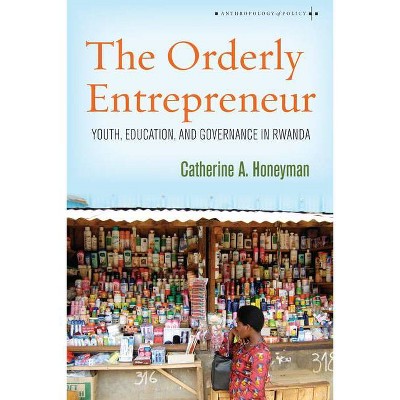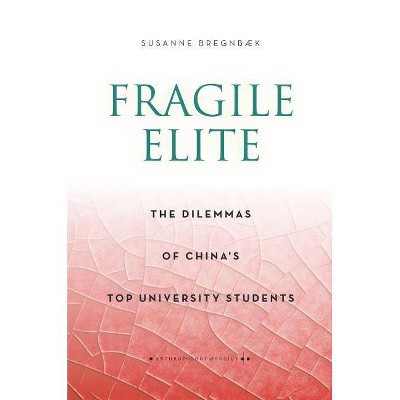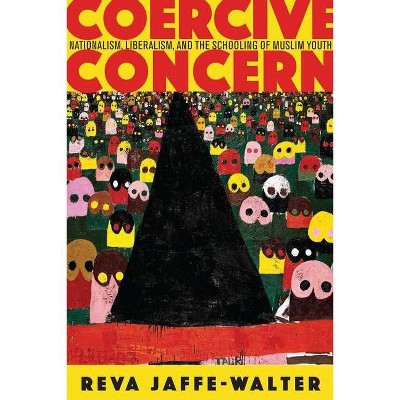Orderly Entrepreneur - (Anthropology of Policy) by Catherine A Honeyman (Paperback)

Similar Products
Products of same category from the store
AllProduct info
<p/><br></br><p><b> Book Synopsis </b></p></br></br>The first generation of children born after Rwanda's 1994 genocide is just now reaching maturity, setting aside their school uniforms to take up adult roles in Rwandan society and the economy. At the same time, Rwanda's post-war government has begun to shrug off international aid as it pursues an increasingly independent path of business-friendly yet strongly state-regulated social and economic development. <i>The Orderly Entrepreneur</i> tells the story of a new Rwanda now at the vanguard among developing countries, emulating the policies of Singapore, Korea, and China, and devoutly committed to entrepreneurship as a beacon for 21st century economic growth. Drawing on ethnographic research with nearly 500 participants, <i>The Orderly Entrepreneur</i> investigates the impact and reception of the Rwandan government's multiyear entrepreneurship curriculum, first implemented in 2007 as required learning in all secondary schools. As Honeyman shows, "entrepreneurship" is more than a benign buzzword or hopeful panacea for economic development, but a complex ideal with unique meanings across Rwandan society. She reveals how curriculum developers, teachers, and students all brought their own interpretations and influence to the new entrepreneurship curriculum, exposing how even a carefully engineered project of social transformation can be full of indeterminacies and surprising twists every step of the way.<p/><br></br><p><b> Review Quotes </b></p></br></br><br>...Honeyman also highlights how presumably well-anchored policies may change in unforeseen ways as they are subjected to policy-makers, implementers and target groups of different communities of practice, something she calls 'negotiated social learning'. This connects to perhaps the book's greatest strength: Honeyman's rich and detailed ethnographic account of how a particular policy - from formulation to its practical effects - is continually recreated in and through human action, interaction and imagination.--Molly Sundberg "<i>Journal of Modern African Studies</i>"<br><br>...The logic of the findings from Honeyman's research must be that there needs to be a radical rethink of how decent employment opportunities can be provided for the vast numbers of unemployed and underemployed young people across the developing (and developed world). Clearly expecting them all to become entrepreneurs is unrealistic. It is not just a question of regulation but of capital, of entrepreneurial flair and of market demand. Not all young people are suited to becoming entrepreneurs and to suggest otherwise is to set up a deficit model of young people which sees them as responsible for their own plight.--Pamela Abbott "<i>Journal of Development Studies</i>"<br><br><i>The Orderly Entrepreneur</i> is a highly compelling analysis of entrepreneurship education in Rwanda as conceived by national and international policymakers; operationalized by teachers; and creatively modified and, indeed, sometimes openly rejected by students. Combining careful attention to the complexities of Rwandan history alongside her original field research, Honeyman provides a strong argument for her conclusion that many creative entrepreneurs are very likely to be disorderly.--Amy Stambach "University of Wisconsin-Madison"<br><br>Honeyman illustrates that micro level factors, such as the design and content of textbooks and the curriculum, are equally as important in determining the outcome of the policy, as the elite narratives which impose the policy in the first place.--Michael Price "<i>Journal of School Choice</i>"<br><br>Honeyman offers a refreshingly new perspective on governance and development in Rwanda...[T]his rich empirical analysis clearly exposes the weaknesses inherent in the post-developmental approach to governance and the significance of young people's everyday responses to policies that fail to reflect their material realities.--Kirsten Pontalti "<i>African Affairs</i>"<br><br>This book is a powerful examination of how Rwanda, Africa's first entrepreneurial state, has harnessed smart education policies to rapidly transform its economy in just one generation. Honeyman underscores the power of consistent policy in balancing between youth creativity and state regulation for economic reconstruction. Africa's leaders can only ignore this book at their peril. It is a potent antidote to Afropessimism.--Calestous Juma "Harvard Kennedy School, author of <i>Innovation and Its Enemies: Why People Resist New Technologies</i>"<br><p/><br></br><p><b> About the Author </b></p></br></br><b>Catherine A. Honeyman</b> is Visiting Scholar at the Duke Center for International Development and Managing Director of Ishya Consulting.
Price History
Price Archive shows prices from various stores, lets you see history and find the cheapest. There is no actual sale on the website. For all support, inquiry and suggestion messagescommunication@pricearchive.us




















